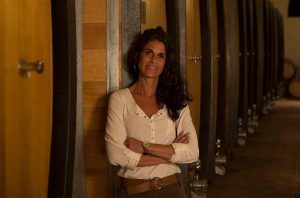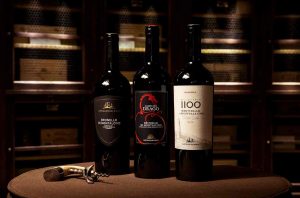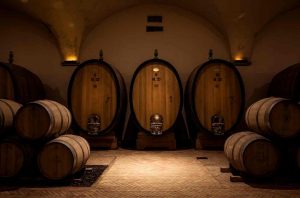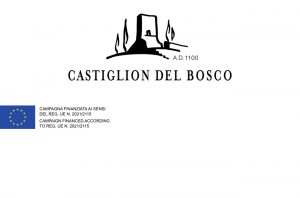Driving along the winding road that leads to Castiglion del Bosco feels very much like diving into a postcard: shafts of golden Tuscan light are filtered by atmospheric woods, with gleaming motes of dust drifting languidly over dewy clearings, while deer gaze into the distance as if themselves amazed by the breathtaking views over the hills of Montalcino.
The wines produced by head winemaker Cecilia Leoneschi convey the same sense of immersive wonder and calm power. Having joined Castiglion del Bosco in 2003, Leoneschi has developed a unique understanding of the Sangiovese variety and of the different micro-terroirs in the sprawling estate’s 2000 hectares – only 62 of which are planted with vines. ‘Throughout my time at Castiglion del Bosco, I have applied my technical experience to better understand and differentiate the singularities of each of our 62 hectares of vines – a jigsaw puzzle of unique soils and microclimates,’ says Leoneschi.

A meeting of minds
20 years after her first vintage at Castiglion del Bosco, Leoneschi has evolved with the project, both as a winemaker and as an individual, making the founding vision of Chiara and Massimo Ferragamo very much her own. She now shares the helm of the estate with CEO Simone Pallesi; together they have defined a trajectory of mindful growth, at the core of which is the exploration of the distinct potential of each specific parcel.
This is as precise as a jeweller’s work, attuned to the geological, climatic and historical nuances that shape the character of the fruit yielded by a given site. ‘This terroir has given us the opportunity to bring the concept of ‘cru’ to life,’ Leoneschi explains, ‘prioritising the expression of a wine’s true identity and soul, in which the idiosyncrasies of each parcel create wholly inimitable wines.’
Recognising the responsibility and complexity of this undertaking – especially within one of the historic estates that founded the Consorzio del Vino Brunello di Montalcino in 1967 – Leoneschi sought, from very early on, the collaboration of experienced and passionate experts. Giuseppe ‘Beppe’ Caviola, of Ca’ Viola fame, has consulted for Castiglion del Bosco for many years, bringing his wide experience and Piedmontese sensitivity to the nuances of terroir.

The beginning of Leoneschi’s third decade at Castiglion del Bosco marks a step further on this quest for excellence and precision-driven expressiveness: the estate recently announced the appointment of Elena and Luca Currado Vietti as consultants. The world-renowned oenologists, known for their role in the creation and interpretation of some of Barolo’s most iconic crus, will be working alongside Leoneschi and Caviola to further understand the intricacies and potential of Castiglion del Bosco’s different plots.
‘This new addition to our passionate team closes a serendipitous circle, from the beginning of my journey at Castiglion del Bosco to the arrival of Elena and Luca as companions on this incredible journey,’ says Leoneschi, while stressing that nothing would be possible without the hard work and expertise of ‘all those who work daily in the vineyard and in the cellar.’
Exploring and defining identity
The meticulous work of Leoneschi and her team relies heavily on a holistic understanding of the landscape, with biodiversity a key factor in the ability of each site to build resilience and express itself. According to the winemaker, this interplay between the living, diverse ecosystem and the vines allows the grapes to hang longer without losing freshness, while developing a wider array of aromas. By fine-tuning the viticultural approach to each (separately vinified) parcel, Leoneschi is able to deliver wines that are powerful but very elegant and nuanced, with floral and herbal notes hovering lightly over a strong fruit and tannic core.

Although consistent in these broader terms – which arguably define a ‘Castiglion del Bosco style’ – the evolution of the estate’s wines under Leoneschi’s tenure has been one of growing vintage and terroir expressiveness, echoing the winemaker’s intense labour of research and experimentation. The flagship Campo del Drago Brunello di Montalcino DOCG has established itself as an iconic single-vineyard Brunello, the Millecento Riserva di Montalcino is an ode to the best vintages of the denomination, while each highly-anticipated vintage of the Zodiac Collection is now highly coveted by collectors.
But for a truly in-depth look at Leoneschi’s endeavours, it’s worth exploring the Rosso di Montalcino range, with three wines from distinct sites – a true laboratory of terroir-aware winemaking. By tailoring the ageing regime to each plot, she has been able to underscore the individuality of each vineyard: the mineral, nervy character of L’America; the perfumed nuances and linear length of Gauggiole; the broody, luscious and savoury depth of Deimassi.
‘It’s not technique that makes a wine; winemaking choices simply facilitate the intrinsic power of the fruit,’ as Leoneschi puts it. This captures the philosophy of Castiglion del Bosco, a place whose greatest asset will always be its 2,000 precious hectares. ‘Every day, as I arrive at Castiglion del Bosco, I pause to think that one could never get used to such beauty; like the renewed pleasure of savouring a glass of great wine.’
Discover more about Castiglion del Bosco
Connect on
Facebook | Instagram | YouTube








